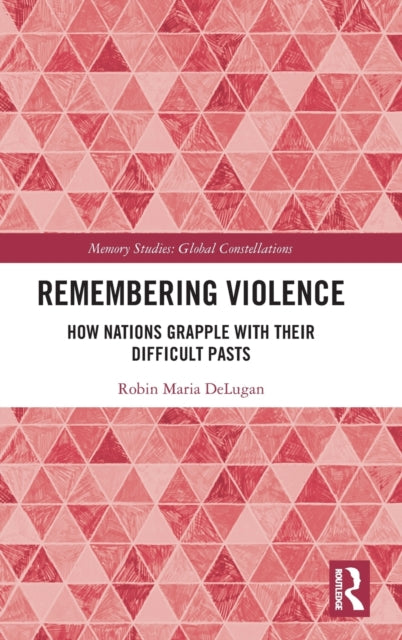Robin MariaDeLugan
Remembering Violence: How Nations Grapple with their Difficult Pasts
Remembering Violence: How Nations Grapple with their Difficult Pasts
YOU SAVE £6.96
- Condition: Brand new
- UK Delivery times: Usually arrives within 2 - 3 working days
- UK Shipping: Fee starts at £2.39. Subject to product weight & dimension
Bulk ordering. Want 15 or more copies? Get a personalised quote and bigger discounts. Learn more about bulk orders.
Couldn't load pickup availability
- More about Remembering Violence: How Nations Grapple with their Difficult Pasts
This book explores how the violent legacies of the 20th century continue to shape the concept of the nation by examining the ways in which three societies commemorate notorious episodes of state violence from the 1930s. It focuses on new public sites of memory, such as museum exhibitions, monuments, and commemorations, and explores the responses of various actors, including civil society, government, and diasporic citizens, as well as those of UN and other international agencies.
\n Format: Hardback
\n Length: 124 pages
\n Publication date: 30 November 2020
\n Publisher: Taylor & Francis Ltd
\n
This comprehensive volume delves into the enduring impacts of the violent legacies of the 20th century on the notion of the nation. By examining the ways in which three societies commemorate notorious episodes of state violence from the 1930s, the author explores the challenges posed to dominant conceptions of the nation. Through extensive ethnographic research in El Salvador, Spain, and the Dominican Republic, Remembering Violence centers on emerging public sites of memory, including museum exhibitions, monuments, and commemorations, which serve as powerful platforms for representing ideas about the nation. The book also examines the responses of various actors, including civil society, government, and diasporic citizens, as well as those of UN and other international agencies engaged in new nation-building goals. By focusing on the ways in which memory practices explain ongoing national exclusions and contemporary efforts to contest them, this book appeals to scholars across the social sciences and humanities with interests in public memory and commemoration.
Introduction:
The 20th century was marked by profound political and social upheaval, leaving a lasting imprint on the world. The legacies of this era, particularly the violent conflicts and authoritarian regimes that emerged, continue to shape our understanding of the nation and its role in the global community. In this volume, we seek to explore the ways in which the violent legacies of the 20th century continue to impact the concept of the nation.
Chapter 1:
The first chapter examines the ways in which the legacies of state violence from the 1930s continue to shape contemporary understandings of the nation. Through a study of three societies—El Salvador, Spain, and the Dominican Republic—the author explores the ways in which attention to these episodes of state violence has resulted in challenges to dominant conceptions of the nation. The author argues that the dominant narratives of nationhood often overlook or downplay the experiences of marginalized communities, leading to ongoing exclusions and inequalities.
Chapter 2:
The second chapter delves into the role of memory practices in shaping public perceptions of the nation. The author argues that memory is a powerful tool for constructing and contesting narratives about the past and the present. By examining the ways in which these societies commemorate notorious episodes of state violence, the author explores the ways in which attention to these events has resulted in new public sites of memory and new forms of commemoration. The author also considers the ways in which these sites of memory have been used to challenge dominant narratives of nationhood and promote inclusivity and diversity.
Chapter 3:
The third chapter examines the responses of various actors to the emergence of new public sites of memory and commemoration. The author argues that the responses of civil society, government, and diasporic citizens have been critical in shaping the way in which these sites of memory are interpreted and used. The author also considers the ways in which these actors have worked to promote inclusivity and diversity in these societies and to address the legacies of state violence.
Conclusion:
In conclusion, this volume provides a comprehensive examination of the ways in which the violent legacies of the 20th century continue to affect the concept of the nation. By exploring the challenges posed to dominant conceptions of the nation and the role of memory practices in shaping public perceptions of the nation, the book offers valuable insights into the ongoing struggles for inclusivity and diversity in the 21st century.
\n Weight: 354g\n
Dimension: 160 x 241 x 16 (mm)\n
ISBN-13: 9780367534806\n \n
This item can be found in:
UK and International shipping information
UK and International shipping information
UK Delivery and returns information:
- Delivery within 2 - 3 days when ordering in the UK.
- Shipping fee for UK customers from £2.39. Fully tracked shipping service available.
- Returns policy: Return within 30 days of receipt for full refund.
International deliveries:
Shulph Ink now ships to Australia, Belgium, Canada, France, Germany, Ireland, Italy, India, Luxembourg Saudi Arabia, Singapore, Spain, Netherlands, New Zealand, United Arab Emirates, United States of America.
- Delivery times: within 5 - 10 days for international orders.
- Shipping fee: charges vary for overseas orders. Only tracked services are available for most international orders. Some countries have untracked shipping options.
- Customs charges: If ordering to addresses outside the United Kingdom, you may or may not incur additional customs and duties fees during local delivery.


